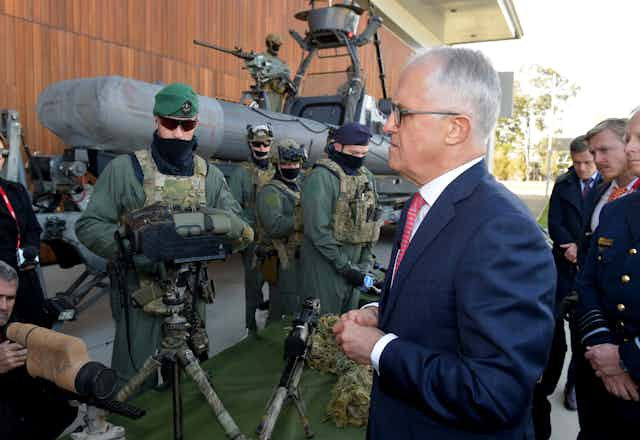The government’s announcement of plans to strengthen the Australian Defence Force’s (ADF) role in domestic counter-terrorism operations appears to be a quick and decisive reaction to the New South Wales coroner’s report on the Lindt Café siege in 2014.
The proposed changes may help to clarify some of the confusion surrounding the role of state police and the ADF in responding to terror attacks. However, to prove effective in practice, the changes will depend heavily on the willingness of state police to accept military advice and assistance.
Changes to call-out powers
The major change proposed is to relax the call-out powers for ADF assistance during a terrorist attack. Prime Minister Malcolm Turnbull described the existing law as “cumbersome” – and it certainly sets a high bar for requesting military involvement.
Currently, the Commonwealth Defence Act provides that the ADF can be called out to respond to violence within state boundaries, but only where:
a state government requests such assistance; and
the state “is not, or is unlikely to be, able to protect itself”.
This is consistent with the Constitution, which allows the Commonwealth to protect states against internal violence “on the application of the executive government of the state”.
A formal request for ADF assistance was not made during the Sydney siege. Despite the many recognised problems with its response, the NSW police force did not believe its capacity to respond to a single armed offender was inadequate.
Details of the proposed changes have not yet been released. But it appears that state governments will be able to request “specialist” or “niche” assistance from the ADF. For example, they may request assistance with specific weaponry such as sniper rifles or other high-powered weapons.
This will provide more flexible arrangements for state governments to request ADF involvement. Rather than admitting that its overall capacity to respond to a terrorist incident is inadequate, a state government could request assistance on more specific grounds.
However, it appears the process will still require state governments to request assistance from the Commonwealth. Whether state police forces will concede that their ability to respond to terrorism is inadequate – even on more specific grounds – remains to be seen.
It also appears that requests for ADF involvement will depend on whether state police classify an incident as an act of terrorism. This in itself is open to interpretation, and may prove difficult to determine in practice.
Changes to military liaisons
Another proposed change is to embed military liaison officers within state counter-terrorism police units. This will help build a closer relationship between the ADF and state police forces - if they can work together well.
During the Sydney siege, ADF liaison officers attended the police forward command post. In his report, the NSW coroner noted that the role of these officers was poorly understood, and that NSW police could have drawn on their expertise to a greater extent.
Controversy remains over whether police failed to heed military advice that their bullets would fragment on hard-tiled surfaces.
Formalising military liaison positions will help clarify the ADF’s role in circumstances that fall short of a formal call-out. However, it seems the key problem to date has not been an absence of military advice, but a lack of willingness to accept it.
Changes to training
A third major change is for special forces soldiers to provide enhanced training to state counter-terrorism police. This is likely to be the most effective strategy for improving operational responses to terrorism.
The ADF has two tactical assault groups – East and West – based in Sydney and Perth respectively. Realistically, these specialist units could only respond to a terrorist attack in one of those cities, or in the event of an extended siege. Having specially trained state police is crucial if first responders are to deal adequately with the threat of terrorism.
Improved training procedures will enable state police to draw on the expertise of Australia’s special forces, while avoiding territorial issues as to who should have jurisdiction in the event of an attack. They also avoid difficult constitutional and democratic issues regarding the expanding role of the military in domestic crime control.
Seeing Turnbull flanked with soldiers in gas masks, as well as soldiers patrolling the streets of Paris and London, should urge caution against an expanding role for the military in public life.

